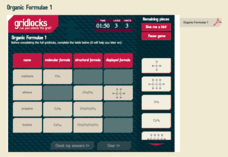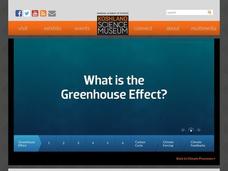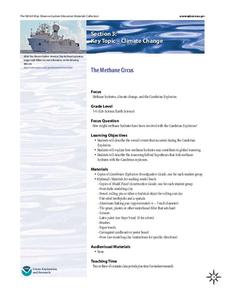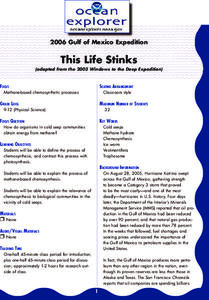NOAA
What's the Big Deal?
Who knew that a possible answer to Earth's energy resource problems was lurking deep beneath the ocean's surface? Part four of a six-part series introduces Earth Science pupils to methane hydrate, a waste product of methanogens. After...
NOAA
Methane Hydrates – What's the Big Deal?
Have you ever tried to light ice on fire? With methane hydrate, you can do exactly that. The ice forms with methane inside so it looks like ice, but is able to burn. The lesson uses group research and a hands-on activity to help scholars...
Curated OER
Changing Planet: Permafrost Gas Leak
Pair earth scientists up to use an amazing online arctic portal mapping tool and Google Earth to analyze permafrost changes. They compare changes to data on atmospheric concentrations of methane to see if there is a correlation. Then...
K20 LEARN
Microbes and Manure = Biofuel
Waste not, want not! Science scholars explore manure as an alternative energy source through reading and experimentation. Groups construct their own biofuel digesters and observe the process of methane production. The teacher's guide...
College Board
2009 AP® Environmental Science Free-Response Questions
How do genetically modified crops affect agricultural practices? This is one of four environmental questions scholars respond to in an AP® test prep resource. Other topics include methane digesters, water runoff, and nitrogen-based...
Royal Society of Chemistry
Organic Formulae 2
Is your chemistry class frustrated by the multitude of representations of organic molecules? Add some challenging puzzles to an otherwise ho-hum organic lesson and let the fun begin! The second of a two-part activity focused on basic...
Royal Society of Chemistry
Organic Formulae 1
Puzzles are the formula for success in organic chemistry! Hydrocarbons abound in the first of two interactives involving basic organic molecules. The easy-to-use lesson is available online and in print form, so you can pick your delivery...
Royal Society of Chemistry
Common Compounds
Can your young chemists identify the most commonly used chemicals in the lab? Introduce the class to the go-to substances in most middle and high school chemistry experiments with an interactive. The resource offers timely feedback as...
National Academy of Sciences
What is the Greenhouse Effect?
The greenhouse effect warms up earth enough so it can support life, but if it heats up too much, life won't be able to survive. An interactive presentation covers the greenhouse effect, the carbon cycle, climate forcing, and climate...
Space Awareness
Greenhouse Effect
A greenhouse provides additional warmth and protection to the plants inside, but what if the greenhouse gets too hot? Pupils discuss and experiment with the difference between natural and anthropogenic greenhouse effect. They measure the...
NOAA
Animals of the Fire Ice
When the sun's rays can't reach the producers in a food web, where does all the energy come from? Extreme environments call for extreme food sources. Young scientists investigate creatures that appear to get their energy from methane...
NOAA
The Methane Circus
Step right up! An engaging research-centered lesson, the third in a series of six, has young archaeologists study the amazing animals of the Cambrian explosion. Working in groups, they profile a breathtaking and odd creature and learn...
Chicago Botanic Garden
Greenhouse Gas Emissions – Natural and Human Causes
Part three in the series of seven has pupils discussing the different greenhouses gases, learning about the carbon cycle, and then watching a short video about the carbon cycle. Based on their knowledge, individuals complete a greenhouse...
NOAA
Importance of Deep-Sea Ecosystems – How Diverse is That?
When judging diversity of an ecosystem, both species evenness and species richness must contribute. After a discussion of diversity and a guided example using the Shannon-Weaver function, scholars use the same function on two other...
NOAA
Deep-Sea Ecosystems – Life is Weird!
A pool of brine in the deep sea can be up to four times as salty as the surrounding sea water. The deep sea ecosystem relies on chemosynthesis and the organisms that live there are often strange to us. The lesson plan focuses on...
Re Energy
Build Your Own Biogas Generator
What is biogas and how is it made? After examining background information about the sources of biogas and biogas generators, class members follow the provided information and build a biogas generator that can be used in the classroom.
Tennessee Valley Authority
Renewable Energy Sources
Not all energy sources are renewable, as learners investigate in this unit. Made up of six lessons that span a few weeks of instruction, the unit has learners examining US energy reserves and consumption, using data to draw conclusions...
Curated OER
Lakes of Methane on Titan
In this methane lakes worksheet, learners read about the false-color synthetic radar map taken by the Cassini spacecraft indicating methane lakes on Titan. Students solve 4 problems about the surface area of the lakes from the image, and...
Curated OER
This Life Stinks
Chemosynthetic communities of cold seep areas are considered in this lesson. Working in collaborative groups, marine biology or oceanography learners research and prepare a report about oxidation-reduction reactions involved with...
Curated OER
Trapping CO2
Students investigate climate change and how the properties of carbon dioxide and methane play a part. In this climate lesson students use a chemical reaction to trap CO2 and methane.
Curated OER
What Makes you Hot?
Students manipulate different variables in a model and make inferences about the temperature on Earth. In this heat lesson students calculate the blackbody radiation of an object at a certain temperature.
Curated OER
Living in Extreme Environments
High schoolers examine the characteristics of the ocean floor and the importance of of extreme environments. For this investigative lesson students use four methods to sample populations, gather, record and analyze data from a...
Curated OER
Resources for Teaching about Biogeochemical Cycles
Students study the different cycles and Earth's systems. In this investigative lesson students study the nitrogen and carbon cycles, play a game pertaining to it and also participate in a class activity.
Curated OER
Earth's Atmosphere II
In this Earth's atmosphere worksheet, students use the chart shown to determine which information is given for each gas. Then they write the names of the layers of the Earth's atmosphere and describe which layer the temperature rises and...

























